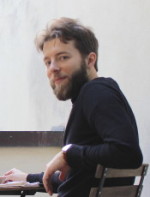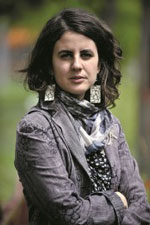|
Readings PIIGS 2015 In the not too distant future the economic crisis (that instead of winding down has accelerated) has transformed Europe into a continent of emigrants. Meanwhile European citizens in the hope of finding work and a better future try to get to the “richer” countries, but are forced to do so illegally because those countries have closed their borders. Amongst the many ways to expatriate, one of the most common is the container: the illegal immigrant boards the container, paying 1000 dollars at the departure and 1000 on arrival, not knowing exactly where he will be dropped off.
 |
AuthorEmanuele Aldrovandi.
Born in Reggio Emilia in 1985. After graduating in Phylosophy and in Literature, he studied playwriting at the Civica Scuola di Teatro Paolo Grassi di Milano.
He won some of the most importants playwriting awards in Italy: the Riccione Prize “Pier Vittorio Tondelli” 2013 with Homicide House, the National Prize “Luigi Pirandello” 2012 with Felicità, the Fersen Prize with Il generale and the Hystrio Prize with Funziona meglio l’odio.
In Italy he works with The MaMiMò Theater Company, as dramaturgy and playwriting teacher.
He wrote several plays and adaptations. Some of his plays are published by CUE Press.
http://www.emanuelealdrovandi.com/
|
 |
Production companyNus Teatre
Direction
Rocío Manzano
Acting
Mireia Scatti, Miguel Simó, Joan Codina and Oscar Jarque
Production
Andrea Calsamiglia and Magalí Permanyer
Translated from Catalan by
Carles Fernández Giua
|
Readings PIIGS 2015 The title of the play is the quote from Rainer Werner Fassbinder’s film In einem Jahr mit 13 Monden. In it, among several other different subjects, he explores the lives of people working in the offices in Frankfurt’s skyscrapers, these symbols of German market and prosperity. Aber die Stadt hat uns geschutzt will be a play about Frankfurt am Main, the play written in SerboCroatian, but also with parts written in broken, immigrant German. The city would be the main character of the play, the city on the big, calm river, the city with all its citizens, with all the different smaller cities inside the big one, with its communities and its immigrants, with its skyscrapers, and Bosnians in one of its bars, with the Euro symbol, with the Euro sculpture on the Willy Brandt Platz, with the Euro statue besides Schauspielhaus Frankfurt, with the Euro statue besides glass theater, and besides glass, tall buildings, where people are producing money, and where people are producing conditions in which the Europeans are living today, with its monetary symbol of Europe, with its symbol under which people protested, protested against capitalism, in the very core of the capitalism, protested and then, of course, stopped protesting, with its Euro symbol under which I have been drinking white wine after other people’s premieres at the Schaspielhaus Frankfurt.
 |
Author
Tanja Šljivar
Born in Banjaluka, Bosnia and Herzegovina in 1988. She holds both BA and MA degree in dramaturgy at Faculty of drama arts in Belgrade, Serbia. She wrote plays Pošto je pašteta? (How much is Pate?), Grebanje ili Kako se ubila moja baka (Scratching or How my grandmother killed herslef) and Mi smo oni na koje su nas roditelju upozoravali (We are the ones our parents warned us of), which were publicly read and produced in professional theaters in Bosnia, Croatia and Serbia. She also writes short stories, radio plays, screenplays for short films and theater-theory texts. She won several awards for her playwriting in Bosnia and Serbia, and her plays have been translated in English, German, Macedonian, Polish, Hungarian and French. She is currently attending MA course in applied theater science in Giessen, Germany.
|
 |
Production companyLAminimAL Teatre
Direction
Daniela De Vecchi
Acting
Cris Codina, Esperança Crespí, Toni Figuera, Andrea Hernandez, Damià Capella, Anna Berenger, Litus Cruces, Xavier Pàmies
Music
Athur Guidi
Technical coordinator
Ignasi Bosch
Acknowledgements
Carles Bosh, Albert Pijuan i Espai ERRE
Translation from catalan by
Pau Sanchis Ferrer
|
Readings PIIGS 2015 Madrid, 2018. The government of Mariano Rajoy has gassed all intellectuals of Humanities of Spain. The public university has been dismantled, reducing all Spanish public universities to a single campus of the Central University Spanish (UCE) housed in a 47-story skyscraper. The government grants a unique fellowship in Humanities since 2016. Currently, there are only three research fellows, Fernando, a researcher in Ancient History of Spain, the first to be awarded a scholarship and Sevillian origin José, fellow in Economics and from Valdepeñas and Nicolas, the new addition, a researcher in philosophy and Valencia Basque origin. The three fellows live in the basement of the UCE, can only see the outside through a remote skylight.
A comedy about the hopelessness of humanistic research and the contempt with which it has been treated by different Spanish governments.
 |
AuthorJavier Sahuquillo
Born in Valencia, 1982. He is a historian (UVEG), playwright and stage director (RESAD). He has attended writing workshops with Jose Sanchís Sinisterra, Paco Zarzoso, Jose Luis Alonso de Santos and Roberto Garcia. Co-director of the theatre magazine Ukränia and member of the company Perros Daneses.
His debut was with the monologue Pasaporte at the XIV Marathon of monologues in Madrid, organized by the Theatre Authors Association-AAT in 2012. In 2013 were premiered the collective play of Teatro Ebrio, La ronda del miedo, and Sonata de los desconocidos at the I Festival Llavoreta Viva. In 2014 were premiered the plays El origen de las especies 2.0, Pasaporte and Después de Europa.
He has published short texts in diferetn magazines, such as Ecléctica, Pliegos and Teatro Mínimo and three plays, Acequia (Editorial Acotaciones a la Caja Negra, 2010), Su turno. Comedia sacra inspirada en la vida de Carlos de Foucauld (Editorial CoCo, 2012) and Fedra (Fundamentos, 2014).
|
 |
Production companyArcàdia Companyia
Direction
Marta Aran
Actresses
Laia Alsina, Lara Díez, Gemma Deusedas i Marta Aran
Translation from catalan by
Rocío García Recuenco |
Readings PIIGS 2015 The sky is a very heavy thing. It is held by a man-made structure ending up on a chair with multiple legs. People live under this gigantic chair that should never be moved. Their daily job is holding the chair legs. The schedule is kept religiously. This is a tightly-knit community surviving with the knowledge one’s mistake will be fatal on everyone. The mantra of responsibility and commitment to the all encompassing goal of constant salvation is reiterated daily.
If anyone’s feet go shaky, if they lose their grip of the chair, the world will fall apart on their heads. Helping out someone during her shift is a deviation. No one wonders about the condition they are living in. No one questions it. Or almost. In the past there have been one or two cases of people voicing some concern but no one really knows what happened to them. Parts of the heavy sky fell on them, that must be it, surely.
In one of the workrooms a GIRL is not so sure they know the truth. She dreams of what owning your arms and legs must be like. She (GIRL) questions the condition they live in. Why do the hands and legs of the people have to belong to someone outside themselves? Her grandmother(WOMAN) is worrying over her granddaughter’s sudden awakening and tries to talk sense to her. But the girl is determined to spread the word. After them there will be more people living like this. They should get to know there are possibilities to live differently.
A father(MAN) is worrying over his son’s (BOY) future in the given regime of slavery. Looking at his son (BOY) holding a chair leg and beginning his shift overwhelms him. What he used to dream of when his son was a baby was so different to this. Can his son fit in this world?
A man in power (MAN ABOVE) is worrying over his losing authority. He can feel something is moving, about to change and it must be what people are thinking. He needs to find a way to turn the situation around to his benefit.
 |
AuthorMaria Tranou
Born in Greece, she studied Writing for the Stage and Broadcast Media at the Royal Central School of Speech and Drama, University of London. Her plays include Cows, (Theatro tou Neou Kosmou, Athens, 2007), Rebirth (Heraclion City Walls, Crete, 2009), New Dad (Battersea Arts Centre, London, 2010), Mammal, love, (staged reading by the Factory Theatre, 2010) and scripts for Dimitris Fotiou’s online works Dystypia and This is Your Home Now and Roof (Festival of dramaturgy on the crisis PIIGS 2014). In 2006 she was awarded the Greek Ministry of Culture 1st prize for writing Where Liromions Grow, a play for children. Published work includes two poetry books (Mandragoras Publishing House, 2008 & 2013). |
 |
Production companyCia. Sargantana
Director
Jordi Pérez i Soldevila
Direction assistant
Marilou Roqueplan
Acting
Carla Vallès, Nathalia Sócrate, Manu Gómez, Carles Garcia-Llidó, Muisès Colinas, Alba Rosa |
|










